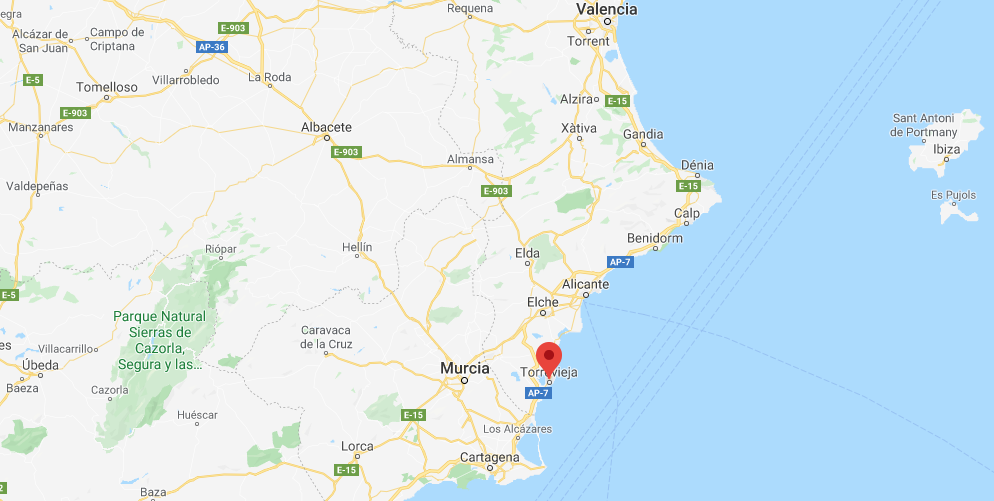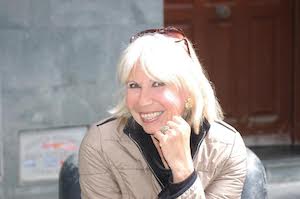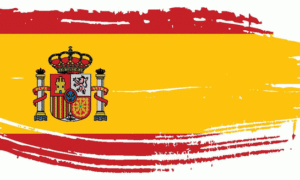(Editor’s note: See our post here documenting what Spain and other countries are doing to stop the coronavirus.)
It’s been 10 days now that Spain is in lockdown. President Sanchez announced on Saturday, 14 March that “the worst is still to come” and it was already clear a few days earlier the original two weeks of confinement would be extended, probably until after Easter.
This has, in fact, just been confirmed.

Gloomy prospects, but citizens have no choice but to comply; otherwise they face hefty fines if caught breaching the decree. Much has been written about other countries in the same or similar situation, as well as about Madrid, which has the largest number of coronavirus cases in Spain. But, what is life like under lockdown in a small seaside resort on Spain’s Costa Blanca?
‘Eerily quiet ….”
Torrevieja, just an hour’s drive south from Alicante, is a sprawling municipality but the town center proper is rather small. It’s the typical Spanish seaside resort – hopping in summer, rather quiet in winter. But a great number of permanent residents are old-age pensioners and there are a great many foreigners. They live here because of the great climate and the healthy sea air.
The lockdown has put an end to enjoying the fresh air and that’s one of the hardest things to bear. We can only go out to shop for food at the nearest supermarket, buy medicine, visit a doctor or optician and …walk the dog. If you don’t have a dog, you are deprived of any kind of exercise in the open air, very difficult for the pensioners I used to see every day walking along the promenade. Or taking part in the free beach exercises.
No more. It’s all closed off, beaches and promenade.
The Town Hall just announced increased patrols to enforce the lockdown, reporting that 100 people in Torreviea alone have already been fined for violation of the order. It’s also forbidden drive with another passenger; walking in the company of others; going shopping unless helping a disabled person or riding a bicycle.
It’s eerily quiet and what few people are out look at each other above their face masks as if the next person is their worst enemy. No friendly nods. No smiles (you couldn’t see them anyway with all the covered up faces). No joy, just a generally hostile atmosphere.
Wearing a face mask is not obligatory and, as experts have pointed out, effective only if you are in close contact with infected people as are nurses, doctors and other sanitary staff. The other day, I went out with a silk scarf covering my mouth because a face mask which fits over my nose gives me panic attacks.
A sign of the prevailing hostile attitude: A woman verbally assaulted me, berating me for not wearing a mask.
No shortages of food, hand sanitizer
Supermarkets are well stocked and the panic buying of the first days has ceased. There are lines with yellow markers on the pavement outside the store at a 1-meter distance and shoppers are admitted one by one, sprayed with hand sanitizers and then have to keep the same distance at the checkout. Some retailers have started not to take any cash because of the risk of contamination, only accepting credit cards even for small purchases.
A less stressful way is to shop in smaller shops like the greengrocers nearly all owned by Indian or Pakistani people. Fewer people go there, so there are no lines, everybody is protected by gloves anyway and the products they sell come from the same markets as the supermarkets. They also sell milk, instant coffee, tea and other essentials.
Probably due to the vast number of elderly people who are residents in Torrevieja, there is an astonishing number of chemists. You find one practically at every street corner. Although two have up signs saying that they have run out of masks, gloves and hand sanitizers, there are plenty that haven’t.
So, now we are faced with another few weeks of misery. One can only hope that they might lift the “no exercise” rule and let us have a walk along the waterfront. Depriving people of exercise and fresh air, which is good for their lungs, doesn’t make any sense and is detrimental to our physical and mental health.
Nobody is looking to throw a beach party and sand and water are not know to transmit the virus. Hopefully Spain will follow the example of Germany in that respect. If not, there remains the balcony from which local residents – starting at at 8 p.m. – follow the lovely habit of applauding the brave medical staff who put their own lives at risk to battle this pandemic.
It’s just about the only sound to be heard in Torrevieja.

About the author:
Inka Piegsa-Quischotte is an international attorney-turned-travel and lifestyle writer. She has contributed to BBC/Travel, several inflight magazines, TripSavvy (Spain) and TravelAwaits among many other publications. After several years in Turkey, she now lives on Spain’s Costa Blanca.
Read more about Spain in our Dispatches archive here.
Inka Piegsa-Quischotte is an international attorney-turned-travel and lifestyle writer based in Spain. She has contributed to BBC/Travel, several in-flight magazines, TripSavvy (Spain) and TravelAwaits among many other publications.














